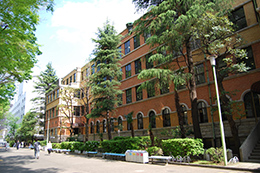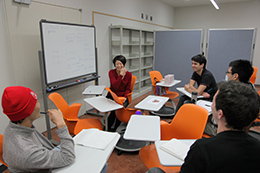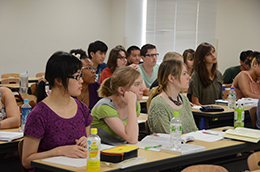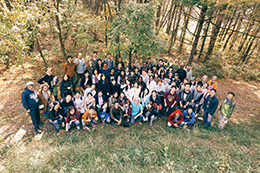JDS中国项目概述大学信息

- URL of Graduate School (English)
- https://www.genv.sophia.ac.jp/
- Name of Course/Program
- International Graduate Course in Global Environmental Studies
- URL of Course/Program (English)
- https://www.genv.sophia.ac.jp/english/
- Degrees
- M.A. in Global Environmental Studies
- Credit and years needed for graduation
- a. Thesis Track / 30 credits / 2 years
b. Credit Track / 34 credits / 2 years
Features of Graduate School

Established in 1913, Sophia University continues to lead the move toward internationalization in Japan by providing a variety of educational opportunities. Over the years, the university has built a unique global network that allows researchers and students from overseas to teach and study in Japan, while Japanese researchers and students to do the same overseas. Sophia provides an excellent educational environment for the era of internationalization by cultivating “Men and Women for Others, with Others” who can excel on the global stage. Key features that make Sophia University unique are following:
1) 13,000 students from diverse backgrounds
2) 544 full-time teaching staff from 23 countries
3) Full degree programs offered in English
4) Wide variety of Japanese language courses
5) Small class size: Student/Teacher ratio of 25:1
6) 387 exchange partner universities in 81 countries/ areas
7) Centrally located urban campus in Japan's political and economic hub: easy access to everywhere
Graduate School of Global Environmental Studies (GENV) was established in 2005 which provides inter disciplinary program by integrating natural science and social science. Our Global Environmental Studies aim for global sustainable development by integrating environment, economy and society. Research objectives is not limited to environmental policies but also include economic and social policies with transdisciplinary and horizontal approach.
We will provide academic guidance for Chinese young government officials based on our experience of environment policies and technologies as well as global case studies. Our faculty members include former officials of Ministry of the Environment, Ministry of Agriculture, and National Institute of Environmental Studies of Japan who could share first-hand experience of environmental policy making. Other professors have been also involved in environmental policy making as expert committee members of national and local governments and will provide pragmatic knowledge to students. Our faculty members are also working for joint research and cooperation projects between Japan and China, and students are welcome to participate.
Other than studying theories, we put a high value for pragmatic approach through field study. GENV established “Sophia’s Forest” as forest environment research and education field in Karuizawa, and has also organized study programs in Ogasawara islands, Hokkaido, Minamata, Ashio Cooper mine, Kabukuri Wetlands, etc. We also hold guest lecture and international symposium by inviting top leaders of international organizations, senior government officials and experts. Located in the center of Tokyo, it is convenient for students to make appointments of interview with relevant organizations.
In 2011, GENV launched International Environmental Program where the students in the program can obtain a Master’s degree in English. All full-time instructors at GENV teach courses and supervise students in English.
GENV aims to build a borderless network of graduates committed to global sustainability. Since opening the doors to students of diverse nationalities seeking a master and doctoral degree in English, our student body has grown to include those from all the continents – from Chile, Colombia and Peru in Latin America, to Canada and USA, France, Norway, UK, Saudi Arabia, Kenya, Malawi, Ghana, Mozambique, Cameroon, Micronesia and from here in Asia those from China, Taiwan, Korea, Philippines, Vietnam, Thailand, Nepal, Myanmar, East Timor among others across the continents. Communication with students in Japanese language taught program is also active.
Features of the Course/Program

Environmental problems are complex issues influenced not only by human behavioral patterns and social systems but also by a range of other scientific and technological factors. We believe that a holistic approach to exploring the roots of environmental problems is necessary and fundamental for all our graduates. We have thus designed a curriculum that offers a broad range of academic disciplines that transcend the conventional boundaries of the humanities and science.
There are two tracks for students pursuing a master’s degree in GENV. For students interested in building their professional career to become an expert in the field of global environmental issues, we offer a credit-track M.A. where students are required to obtain 30 credits from lecture courses and complete a graduation project written report in English. For those students interested in exploring a specific area of environmental studies in-depth, we offer a thesis-track M.A. where students are required to obtain 22 credits from lecture courses and complete a thesis paper.
Intensive one-on-one advising is conducted to ensure each individual student’s needs are met. The number of students per class is typically between 5 and 30. The instructors are prepared to provide individual guidance to each student in the process of setting a research topic and writing a thesis. If necessary, they are ready to teach the basics of academic research even for the students who are not equipped with basic mathematical or statistical skills.
Necessary Curriculum to Obtain the Degrees
Courses taught through English language for the 2024 academic year (English Course)
Note: Student can transfer up to 8 credits as elective class from courses taken from other graduate schools of Sophia University as well as from Tokyo University of Agriculture and Technology and United Nations University.
List of Faculty members capable of guiding JDS China Fellows
and their Research Specialties
HUANG Guangwei, Professor
McDONALD Anne, Professor
QIAN Xuepeng, Professor
ORI Akemi, Professor
PUTHENKALAM John Joseph, Professor
SUZUKI Masachika, Professor
TANAKA Yoshinari, Professor
TSUGE Takahiro, Professor
ANNO Sumiko, Professor
NAKAGAWA Yoshinori, Professor
https://www.genv.sophia.ac.jp/english/research/index.html
# All the professors above are qualified to supervise JDS China students.
# Student chooses their own supervisor at the beginning of the first semester.
Academic Schedule
Facilities (ex: Library, PCs, Gymnasium etc.)
The Central Library of Sophia University collects over 1.07 million books including 500 thousand foreign books, along with 43 foreign newspapers and 30 thousand e-journals. GENV has its own research room with lockers in the library.
Advice for Graduate School Applicants

To solve environmental problems and promote the transition to sustainability, review of the whole social economy system is necessary through inner-governmental corroboration among ministries working for environmental protection as well as economy, energy, transportation, finance, science, etc. GENV has accepted many students from various departments of Chinese government, and we welcome all the application from any department of central/provincial government.
Interdisciplinary approach beyond the cross border of social science and natural science is important to analyze problems and find workable solution. Enhanced international perspective in such a highly international environment as GENV will also be useful for the purpose.
We sincerely welcome your application with strong passion for research endeavor and practical solution toward global sustainable development. Please feel free to contact us for any questions.


